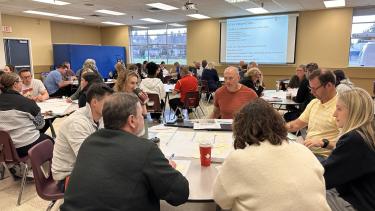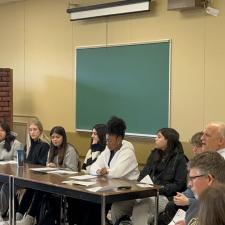
Listening to Student Voice to Improve School Culture
This year our staff has been addressing the impact that the pandemic has had on learning and school culture. This includes the impact on students from abbreviated curriculums, the short periods of online learning, and the absence of extracurricular activities and sports. A goal for us this year has been to focus on rebuilding school culture. A culture that is inclusive, engaging, and responsive to each student’s needs.
As we work towards this goal, a group of seven students has been working in parallel with us to find our student voice; inspired by the work of Shane Safir author of Street Data. Our students began this work in October where they were tasked with identifying an equity or inclusion challenge that they wanted to address. They like our staff; they chose school culture. Their initial inquiry was "How can we create a positive school culture at Yale?" The students then conducted empathy interviews with some of our marginalized students to gain a broader insight into the student experience here at Yale. The street data they uncovered led to additional questions causing them to refine their inquiry to "How can Yale create a more inclusive learning environment that is responsive to the individual needs of each student?"
After interviewing approximately 130 additional students, responses were placed into five categories: 1) Building strong relationships with students, 2) Providing personalized and individualized learning experiences, 3) Offering relevant and engaging curriculum, 4) Implementing differentiated Instruction, and 5) providing mental health and wellbeing support.
Our students shared their findings with Yale staff at our March 31st SLO through a Kiva Panel followed by a round table discussion in which our students were key participants. Something that should not be overlooked is that this type of meaningful interaction and reflection takes real courage. Courage from dedicated staff to honestly listen amid post-pandemic fatigue and unprecedented educational challenges. Courage from students to be vulnerable and share personal but impactful stories. Change takes courage.
As a result, our staff has begun having conversations about what we have heard and how this can further impact our own practices. We acknowledge that as individuals we all have different strengths and areas for growth in what the students have identified. A one size fits all approach is not the way to address this. However, we agree that continuing to build strong relationships with students and providing mental health support for student well-being is an essential starting point. Several staff and students are creating a resource for staff to use in September as an entry point in relationship building and well-being. Our students sharing the street data that they uncovered was not a culminating exercise, but rather a beginning on our journey on improving school culture at Yale.
JAMES MACLAREN, TEACHER
Yale Secondary
